If you’re curious about where to get the best plant-based burger money can buy, we’re here to tell you that you’re more likely to find it in your own kitchen than at your favorite fast food restaurant. Right now, the big fast-food chains are taking a decent stab at the plant-based burger but — with the exception of a very small few — most plant-based burgers in the fast food landscape are far from mind-blowing.
They’re all edible. But none of them are crave-worthy (unless you count the Impossible Burger at Umami as “fast food”).
Luckily, the same meat imposters that can be found in those mediocre plant-based burgers are also readily available at a grocer near you. And a homemade plant-based burger really can be delicious enough to actually rival the real thing. These ingredients, more than even regular beef, seem to benefit from a little TLC and a lack of lunch-rush pressure.
We taste-tested and ranked the eight popular grocery store plant-based burger brands to find which one you need to pick up on your next grocery run. Check the full ranking below.
8. Dr. Praeger’s — California Veggie Burgers
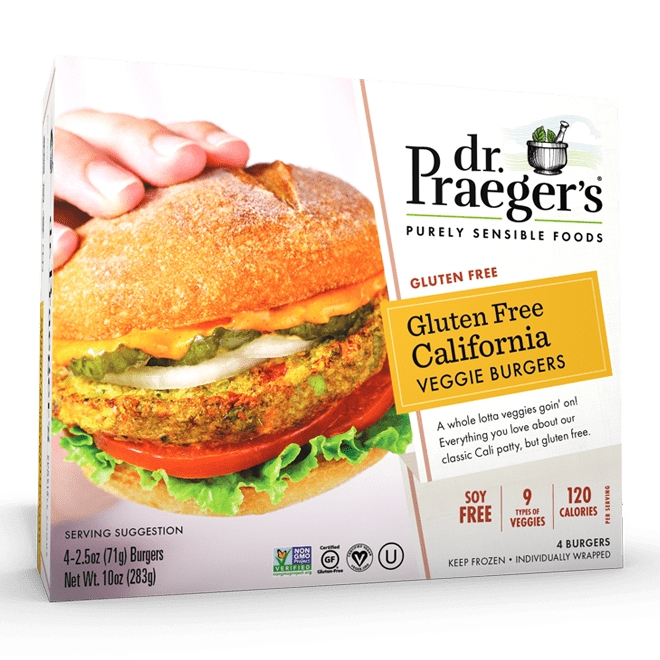
Average Price: $3.99
Protein: 5g
The “Meat”:
Dr. Praeger’s California Veggie Burgers make no attempt to be fake meat, and that’s not necessarily a bad thing. Before we had meat 2.0, we had veggie burgers — the OG plant-based meat product! This blend consists of carrots, peas, zucchini, onions, spinach, broccoli, corn, bell peppers, string beans, and soybeans and it’s pretty simple to pick each of those ingredients out visually when you look at the weird yellow and beige Praeger’s patty.
To be honest, I found this weirdly comforting. With some plant-based products, you can’t tell what you’re eating — Dr. Praeger’s makes it obvious.
Alas, we’re still ranking this one last. Not because it doesn’t taste good. It tastes fine. But because no matter how closely you follow the directions, no matter how long you let this frozen patty thaw out, it’ll always be frozen in the middle. I’ve let it sit for hours before cooking, and it still failed to not be frozen. The directions state “cook burger approximately seven minutes until browned. Carefully flip and cook an additional five minutes until heated through and well browned.” If you follow those directions your patty will be frozen. If you attempt to cook it a second longer, it will dry out. Another second and it will burn.
The idea is great, but there is no winning with this one.
The Bottom Line:
You’re better served cutting this one into chunks, cooking it stir-fry style and then tossing it over a salad or throwing it in a tortilla. That method works great… but it’s not a burger.
7. Morning Star Farms — Veggie Grillers Prime
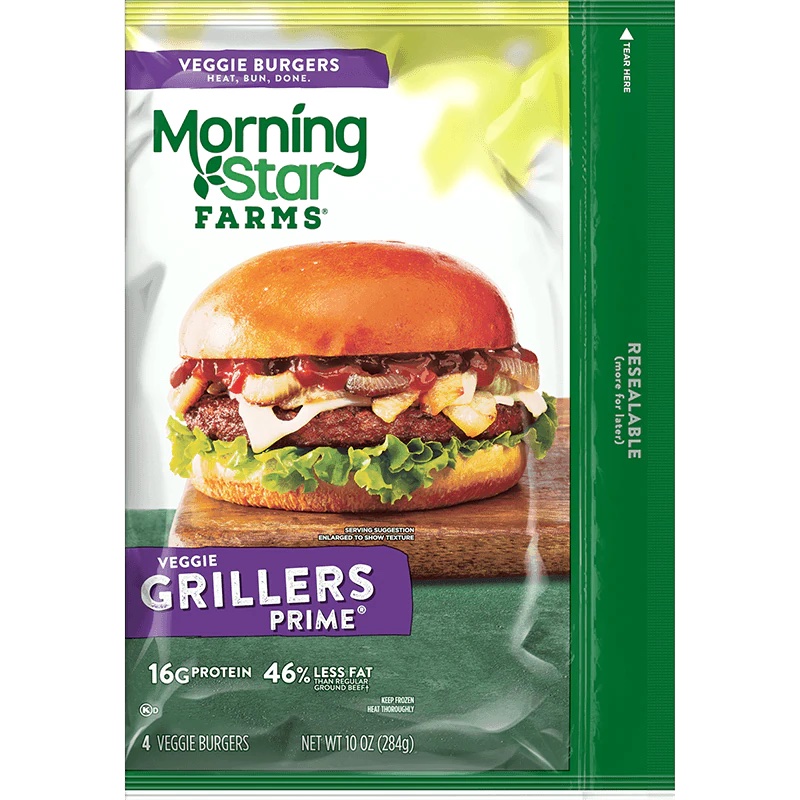
Average Price: $4.49
Protein: 16g
The “Meat”:
When I was collecting brands to review for this article, Morning Star Farms was one that was constantly recommended to me by vegetarian friends. But now, four Morning Star veggie burgers later, and I can’t seem to understand why. It’s not that the Veggie Grillers Prime is bad — like Dr. Praegers, the patties are fine — but they didn’t exactly blow me away or convince me that this is in any way an adequate substitute for a good ‘ol beef burger.
The ingredients list isn’t nearly as comforting as what Dr. Praeger’s has got going on, either. There is a lot of wheat gluten, water, oils, and soy products here. But strictly from a flavor standpoint, it’s a definite step up from Dr. Pragers. The veggie patty is well seasoned, with a nice blend of garlic and onion powders, and there’s even a smokey, charred flavor to it. And yet… it comes off as a little too artificial for my liking.
At least it cooks all the way through easily and I wasn’t plagued by a frozen tooth-chipping middle, like with Dr. Praeger.
The Bottom Line:
One of the better-frozen veggie patties out there, with flavors that attempt to recall a real hamburger.
6. Whole Foods 365 — Plant-Based Burger Patties
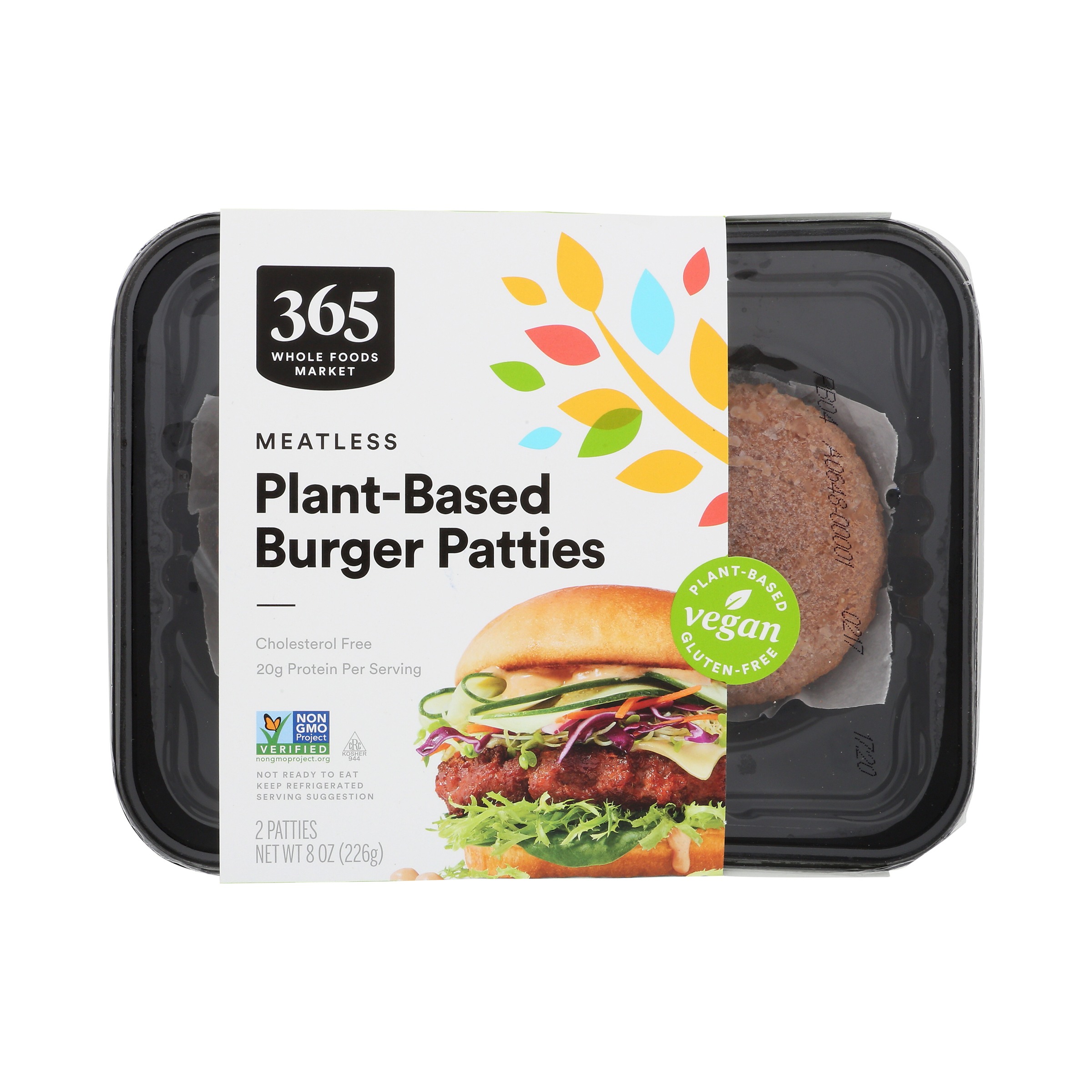
Average Price: $4.99
Protein: 20g
The “Meat”:
Whole Foods’ Plant-Based Burger patties fall in the same category that Beyond and Impossible inhabit. These are designed to mimic the look, taste, and feel of an actual hamburger. The flavor is only marginally better than Morning Star Farms though. The problem here is the texture. It’s a little too mushy, and because it looks so much more like a burger than the other veggie patties, your instincts will tell you that it needs more time on the skillet.
Ignore those instincts. You will burn this thing, as I did, and once it’s burnt it creates a really awful mouth texture. You’ll have a harder, stiff outer and a soft mushy inside. On my second attempt, I actually cooked it right, which looked unappetizingly under-done, but that mushy inner texture was still there. Luckily this patty takes on the flavors of whatever you season it with — so, coupled with cheese, grilled onions, sauce, and a nice brioche bun, its mouthfeel is no problem.
Aside from Dr. Praeger’s which stayed frozen, this patty gave me the most trouble. And — since you can’t microwave this brand like with with Praeger and Morning Star — it strikes me as the least convenient.
The Bottom Line:
If you’re piling your burger up with the works, this is a fine meat substitution. If you like your burgers on the plain side, Whole Foods’ plant-based burger can have a distracting chewy texture and a bland flavor.
5. Lightlife — Plant-Based Ground
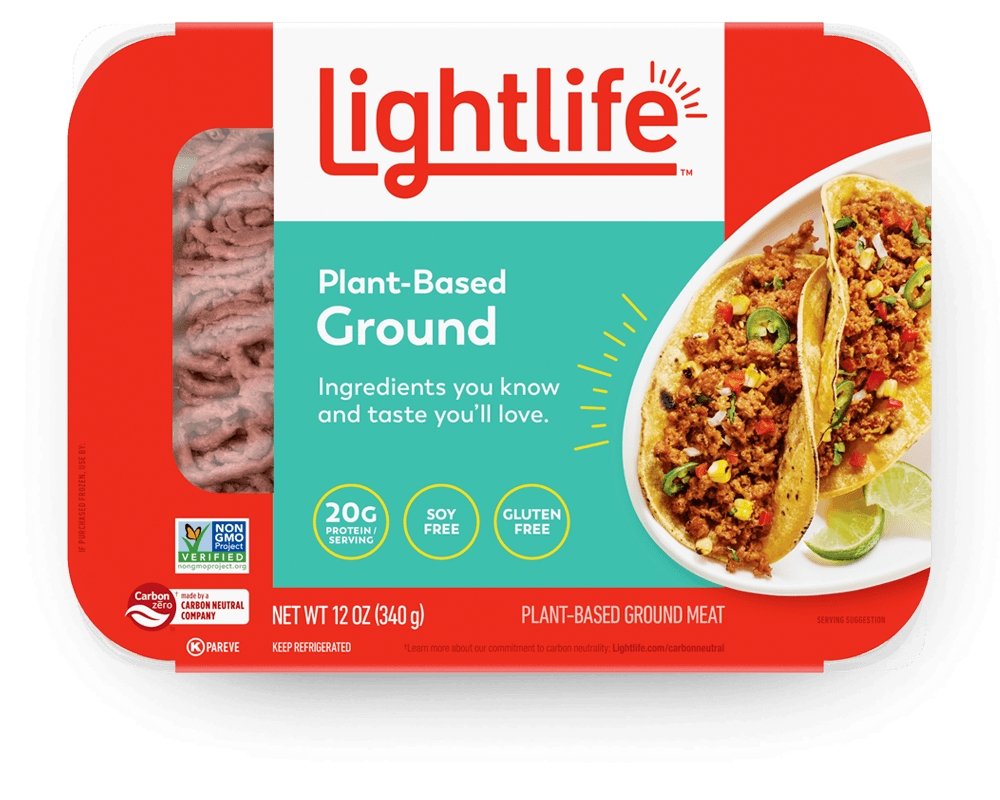
Average Price: $7.99
Protein 20g
The “Meat”:
I tried Lightlife on the advice of my editor, and I opted for the ground meat option as opposed to the pre-formed burger patty because that’s what he’d had. If you want a burger, don’t do this, plant-based ground “meat” isn’t quite as easy to form as regular ground beef.
You can shape it just fine, but the off-putting oily texture is downright unappetizing. I don’t love handling raw meat, but I’ll take forming a traditional burger patty to forming this plant-based version any day. Like a lot of the plant-based brands, Lightlife uses beets to add some pinkness to the meat in an effort to look more natural, but that pink color doesn’t ever really cook away, which ends up looking… unnatural.
Where Lightlife excels is in its ability to be an absolute flavor sponge. This plant-based meat is a neutral canvas for you to throw flavors at, so if you break it up in chunks and cook it in a skillet with some potatoes, bell peppers, onions, and cilantro, with a dash of cumin, you’ve got an amazing taco-filling. As a burger, however, this one is bland, dry, and chewy. And unless you want to work your seasonings into the meat (which is a lot more work) the middle of the burger will taste like mostly nothing.
The Bottom Line:
If you want a versatile plant-based meat product that you can turn into all sorts of different dishes, this is a great pick! As a burger? Middling.
4. Trader Joe’s — Protein Patties
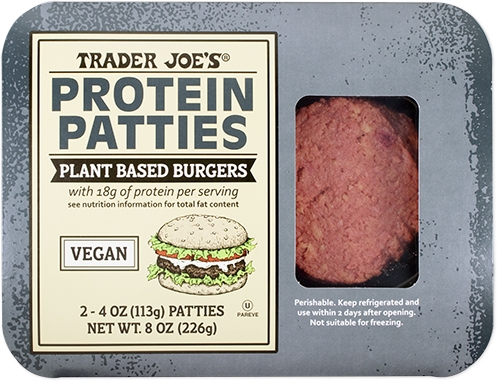
Average Price: $4.49
Protein: 18g
The “Meat”:
It shouldn’t surprise anybody to see Trader Joe’s ranking on the better end of this list, the retailer has been doing plant-based burgers since before they became trendy. Overall this is a very solid attempt. When raw, it looks like meat and the use of beet juice isn’t overdone — which enables your burger to cook brown on the outside, while still retaining a pink middle that recalls a medium-rare beef patty. This meat also has a smokey flavor to it that recalls a charbroiled burger. I cooked it on a cast iron pan but I imagine the result would be even more convincing if cooked on a grill.
Sadly, like the lower-ranked entries on this list, you’ll never achieve that Maillard burger crust like you’d get with real meat. Couple that with a chunky pre-formed shape and once cooked this meat has an uncanny valley-type appearance that I found unappetizing. You’re not going to be fooling anyone (or yourself) into thinking this is a real burger if that’s your goal, but flavor-wise it tastes more like actual meat than it looks.
The Bottom Line:
Smokey with a convincing meat texture, but a little too thick and chunky for my liking. This results in some long and labored chewing, which always reveals just how unlike meat these things still are.
3. Field Roast — Chef’s Signature Plant-Based Burgers
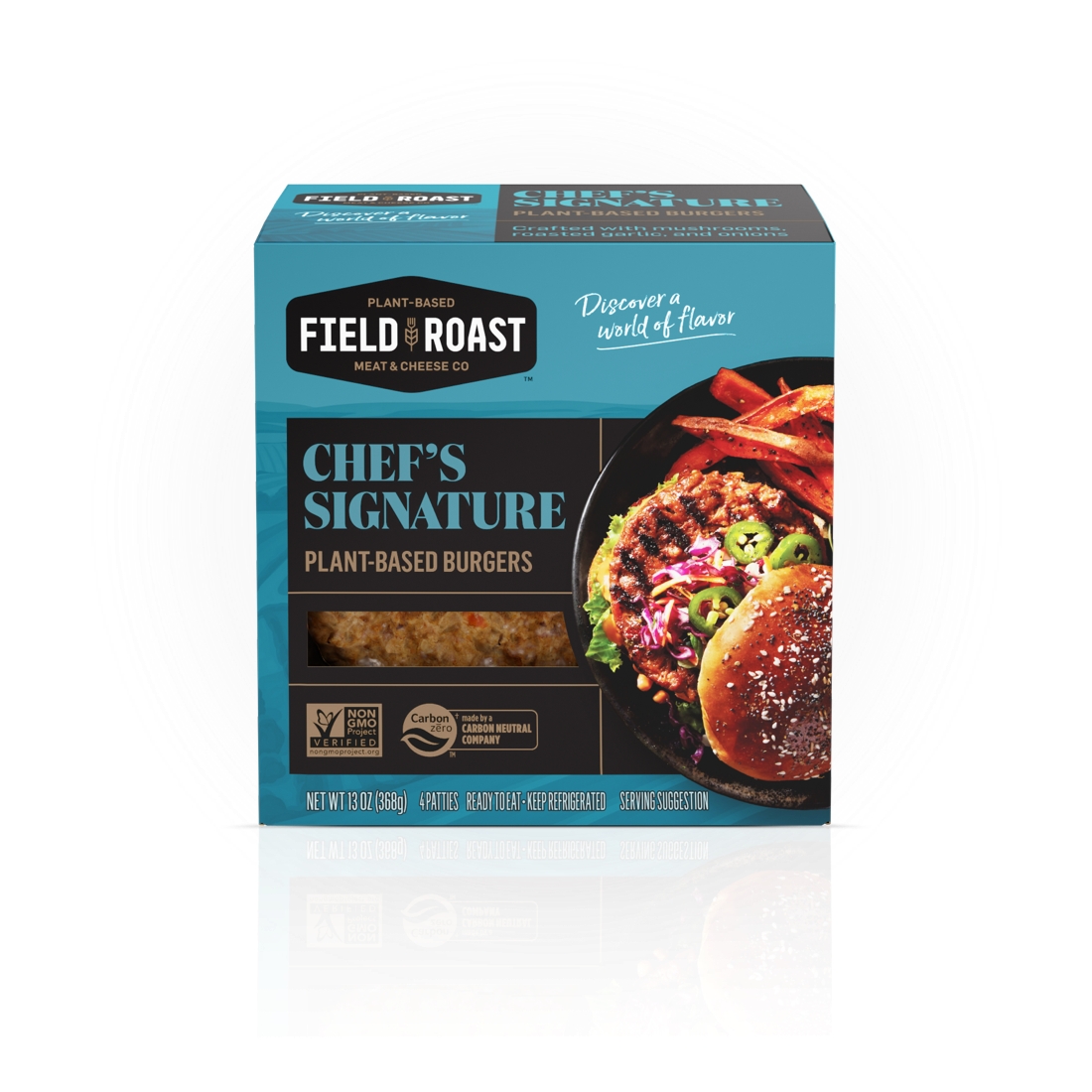
Average Price: $5.93
Protein: 21g
The “Meat”:
I’ve been pretty excited to give Field Roast a try because it’s a brand that constantly aligns itself with cool chefs — from Action Bronson to Roy Choi. It’s very much geared toward the culinary-minded, but it turns out that that’s really more clever marketing than any actually definable quality It’s pretty in line with the other plant-based meats on this list, but it has a few qualities that set it apart.
Like Trader Joes’ patty, Field Roast’s Chef’s Signature has a distinct smokey charred like flavor to it, but it’s more subtle here and with the inclusion of shiitake mushrooms, porcini mushroom powder, and roasted garlic in the ingredients list, it has a great savory flavor with sumptuous umami notes that can make the mouth water, no seasoning necessary.
It also uses tomato paste to produce its “natural” burger-like color, which I think presents itself better than beet juice (though I’m not entirely sure that is a part of a burger experience that we need to insist on importing into the plant-based meat realm in the first place).
The Bottom Line:
Smokey with notes of umami, Field Roast’s Chef’s Signature tastes like a plant-based burger with a lot of thought put into it, from presentation to the overall flavor.
2. Beyond Meat — Beyond Burger
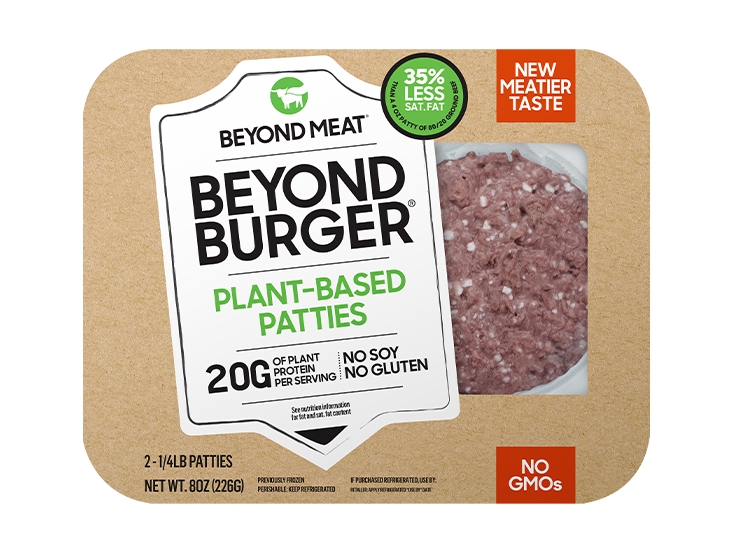
Average Price $5.39
Protein: 20g
The “Meat”:
There is a reason Beyond Meat and Impossible Foods have become the new fast food standard when it comes to plant-based meat — they’re both very good and very convincing. Beyond has changed up their formula a few times since first launching over five years ago, this newest iteration is soy-free and made using a blend of pea and rice proteins, with beet juice and pomegranate concentrate for color, and a whole lot of other seemingly random ingredients like a marginal amount of potato starch, cocoa butter, and lemon juice.
Whatever they’re doing with all those ingredients, they’re doing right. The meat patties have these visible flecks of fat throughout — I’m guessing that’s the coconut oil — which sizzles nicely in the skillet and the overall flavor is very… beefy, for lack of a better word. Like with a lot of the other options, this brand goes absolutely nuts with the beet juice, making this burger actually bleed between bites. I don’t need the simulated bleeding, and since that beet juice does nothing for the flavor I’d actually prefer if it wasn’t there, but hey, if that adds to the sensory experience for you, I’m sure it’s something to be appreciated.
Once cooked up, this burger patty will take on a charred appearance that looks eerily similar to real meat and keeps that verisimilitude in the texture. It doesn’t have any of that fake smokiness that Field Roast and Trader Joe’s have, but I think that puts the power in the hands of the cook, you can season this with whatever you want. Caramelized onions are a must!
While it comes damn close to mimicking actual meat, it’s still a little too chewy and dry to be perfect. If they ever find a way to make this thing retain some juiciness, I can see it easily replacing an actual hamburger. But it isn’t quite there yet.
The Bottom Line:
Beyond Meat truly lives up to its hype. It has a familiar beefy flavor, bleeds between bites (If you’re into that), and has a texture that comes incredibly close to actual meat. It’s also not a soy-based patty, which might make a break a brand for you.
1. Impossible — Impossible Burger
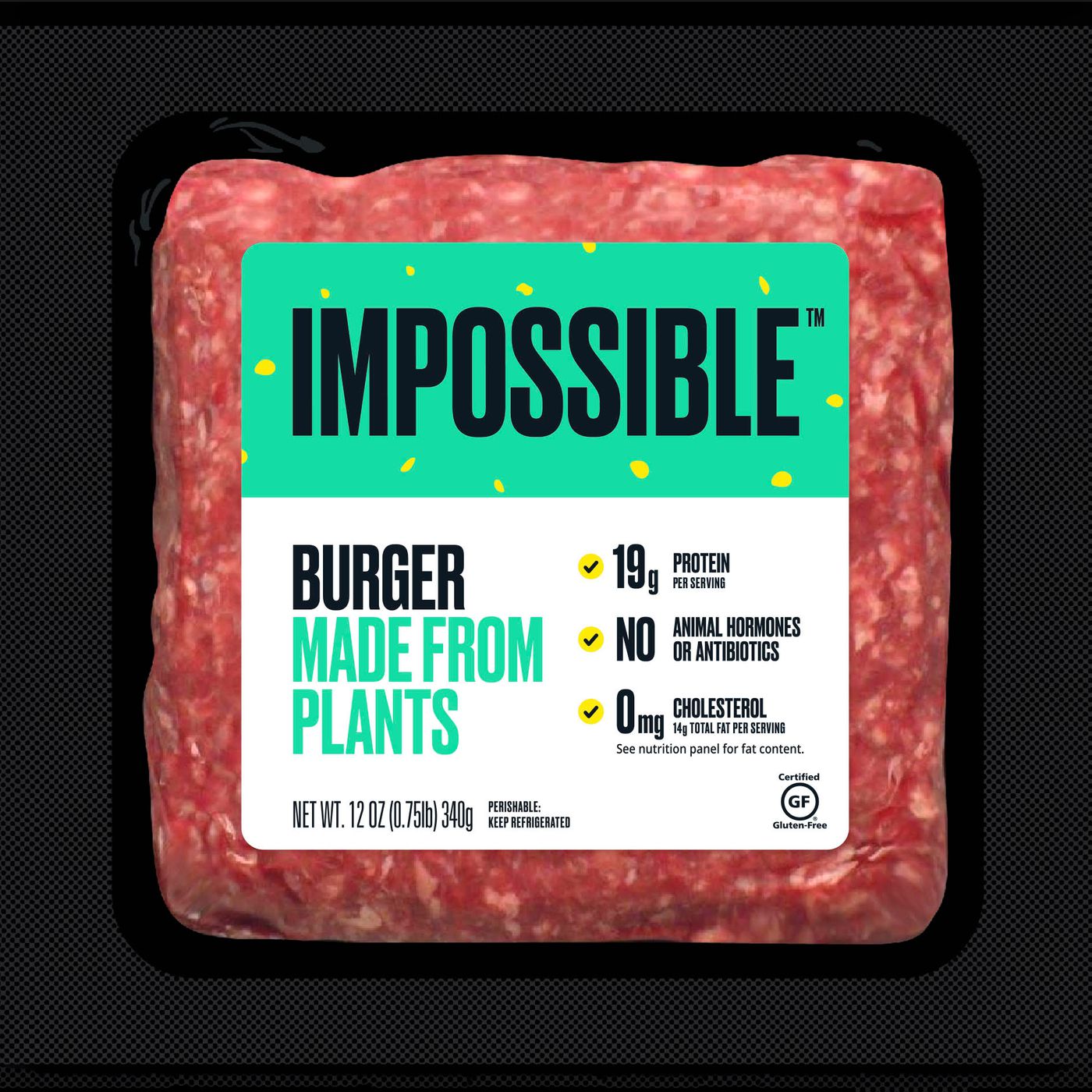
Average Price $6.49
Protein: 19g
The Impossible Burger tastes and looks so much like ground beef that it’s actually kind of amazing. A lot of the other brands out there come pretty close to mimicking the look and feel of meat, but you can always tell there is something not quite right about the patties. They’re always a little too perfect, too well-formed, too pink! That’s not an issue with Impossible.
The Impossible Burger comes packaged like your favorite grass-fed burger brand, a square piece of “meat” in a vacuum-sealed package. Forming it in your hands feels oily but nearly identical to actual meat and, when thrown on a pan, it crackles and sizzles like meat should, resulting in a beautifully caramelized crust. Better still — and unlike Beyond — the meat here actually retains some of its juiciness.
Biting into this burger offers a juicy, savory experience — with flavors that come in waves, greeting you with a subtly smokey quality and settling into an earthy-y, lean meat quality. It’s not quite as juicy as an 80-20 blend of ground meat, but it tastes so similar to beef that it isn’t just good for a plant-based burger, it’s downright better than a lot of the value menu burgers you can find at places like Burger King and McDonald’s.
Impossible achieves this by adding an essential molecule known as “heme” to their formulation, which is a natural molecule that contains iron (and gives blood its red color) and apparently gives meat its meaty flavor. Impossible’s plant-based heme is made by combining actual heme extracted from soybean roots, which is then inserted into genetically engineered yeast. I don’t really understand the science behind it — Impossible has a whole page dedicated to explaining it — but it really pays off.
This does in fact taste very similar to actual beef. If you can get past thinking about how manufactured it is.
The Bottom Line:
The closest any plant-based meat has ever come to tasting like actual ground beef. It’s not the juiciest burger you’ll ever have (nothing beats animal fat… yet) but it is hands down the best plant-based product on the market. You can buy this stuff and make a burger that even the biggest meat-lover in your life will be able to appreciate.
The Bottom Bottom Line:
It’s better than anything you’ll find on a fast-food value menu.